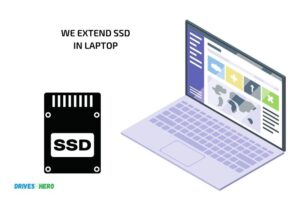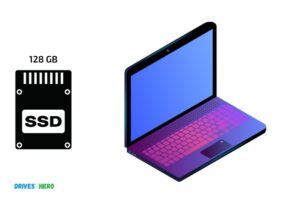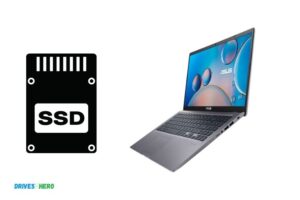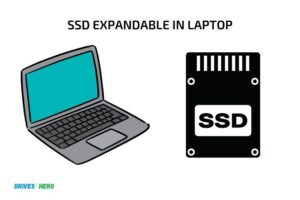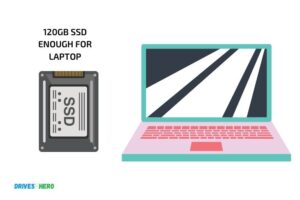Ssd Vs Hdd Laptop Battery Life: Which One Better!
When comparing SSDs and HDDs in terms of laptop battery life, SSDs offer longer battery life due to their lower power consumption and more efficient performance.
SSDs (Solid State Drives) consume less power than HDDs (Hard Disk Drives) because they have no moving parts.
HDDs use spinning disks and a moving read/write head, which consumes more energy. As a result, laptops with SSDs generally have longer battery life compared to those with HDDs.
Opting for a laptop with an SSD can significantly improve battery life compared to an HDD-equipped model.
The reduced power consumption, increased efficiency, and overall better performance make SSDs the ideal choice for those who prioritize battery life in their laptops.
5 Features of SSD and HDD Laptop Battery Life
| Feature | SSD | HDD |
|---|---|---|
| Power Consumption | Lower power consumption (2-4W) | Higher power consumption (6-7W) |
| Impact on Battery Life | Longer battery life | Shorter battery life |
| Speed | Faster access and data transfer | Slower access and data transfer |
| Efficiency | More efficient use of battery | Less efficient use of battery |
| Noise | Noiseless operation | Some noise during operation |
Key Takeaway
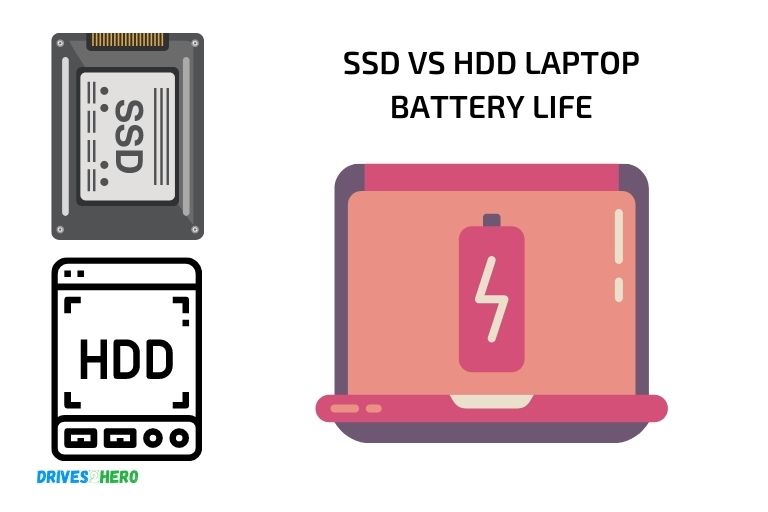
Four Facts About Ssd Vs Hdd Laptop Battery Life
Benefits And Drawbacks Of Ssds For Laptop Battery Life
Ssd vs hdd laptop battery life: benefits and drawbacks of ssds
When it comes to choosing a laptop, storage plays a critical role in the decision-making process.
Solid state drives (ssds) are becoming a popular choice for laptops due to their enhanced performance and improved battery life.
We will delve deeply into ssds and analyze the benefits and drawbacks of choosing an ssd over a traditional hard disk drive (hdd) for laptop battery life.
Durability And Reliability Of Ssds
One of the significant benefits of an ssd is its durability and reliability. Ssds lack moving mechanical parts found in hdds, meaning fewer chances of physical damage.
According to a study, ssds have a lifespan of around 2 to 3 million hours, making them more reliable than hdds.
Here are some of the benefits of ssds over hdds in regards to durability and reliability:
- Ssds have a low risk of crashing, and therefore there is a lower chance of data loss
- Ssds have faster data transfer rate, arm motion and rewiring is not necessary as it is with the traditional hdd
- Ssds produce less heat and consume less power, hence reducing the risk of overheating in laptops.
Impact Of Ssds On Laptop Battery Life
When it comes to battery life, ssds use less power than their hdd counterparts.
Ssds consume less energy as they do not require motors to spin up disks, read, and write data. This reduced energy consumption leads to an increase in battery life.
Here are some advantages of ssds on laptop battery life:
- Ssds reduce the power consumption, thus extending battery life
- Ssds speed up the time required to start up the laptop and start applications, hence less battery usage
- Ssds are lightweight, less power-hungry, and faster, making them the best choice for laptops to promote longer battery life.
Ssd Performance And Laptop Battery Life
Ssds provide faster boot-up times, applications run smoothly, and transfer rates are fantastic than those of HDDs.
They also help in enhancing the overall performance of the laptop. However, faster performance can lead to increased power consumption, thus affecting battery life.
Here are some highlights of ssd performance on laptop battery life:
- The performances of ssds enhance the overall performance of the laptop, and it becomes much faster
- Ssds consume less energy while reading and writing data, and this leads to an increase in battery life
- Ssds also execute the commands and access the stored data much faster than an hdd.
Ssds offer superior benefits over hdds in regards to laptop battery life, performance, reliability, and durability.
Ssds are the way to go for anyone looking for a faster, reliable, and powerful storage solution for their laptop.
Benefits And Drawbacks Of Hdds For Laptop Battery Life
Ssd Vs Hdd Laptop Battery Life
As technology continues to advance, the storage capacity of laptops has continued to increase.
This increase in capacity has led to the development of two primary storage types – the solid state drive (ssd) and the hard disk drive (hdd).
While both options have their advantages and disadvantages, this article will focus on the benefits and drawbacks of hdds for laptop battery life.
Hdd Capacity And Laptop Battery Life
One of the primary benefits of hdds is their high storage capacity which makes them ideal for storing large files such as media, documents, and software.
However, this also means that hdds require more power to run, which can significantly impact laptop battery life. The more capacity an hdd has, the more the battery life will be affected.
Here are some points that explain the impact of hdds on laptop battery life.
- Hdds use mechanical parts to read and write data, which consumes more power than ssds.
- Hdds are slower than ssds, which can cause the laptop to consume more power as it takes longer to complete tasks.
- Larger-capacity hdds require more power to spin, which further decreases laptop battery life.
Hdd Performance And Laptop Battery Life
Hdds are an older technology, and they are generally slower than ssds. This means that a laptop with an hdd will take longer to boot up, launch applications, and complete other tasks.
While hdds provide ample storage space, the slower processing time consumes more power, causing laptops with hdds to have a shorter battery life.
Here are some points that explain how hdd performance impacts laptop battery life.
- Since it takes more time to complete tasks, hdds keep laptops running for much longer, consuming more power and impacting battery life.
- Larger programs require more time to load, which slows down the system and negatively impacts the battery life.
- Hdds are more prone to errors and failures, which can cause the system to consume more power as it tries to recover from them.
While hdds provide a more extensive storage capacity, they significantly impact a laptop’s battery life. Ssds are the better option for devices that require faster performance and longer battery life.
Power Management Tools And Their Impacts On Laptop Battery
Ssd vs hdd laptop battery life: power management tools and their impacts on laptop batteryLaptop power management is critical to battery life, and ssds and hdds differ in power consumption.
Let’s take a closer look at how operating systems handle power management with ssds and the role of power management tools with hdds.
How Operating Systems Handle Power Management With Ssds
Operating systems handle power management in various ways, but they typically optimize power consumption by:
- Reducing cpu workloads by managing power states and clock speeds
- Turning off hardware components that are not in use
- Managing the display, keeping it dim and turning it off when not in use
- Putting the system in sleep or hibernate modes when idle
Through these power management techniques, operating systems can significantly extend the battery life of ssd-based systems.
The Role Of Power Management Tools With Hdds
Power management tools can help to conserve battery life in hdd-based systems. Key tips and techniques include:
- Reducing the display’s brightness to minimize energy usage
- Unplugging external devices, such as usb printers and cameras, when not in use
- Disabling unnecessary startup programs, background processes, and services
- Checking for any battery-draining apps and closing them
As you can see, some of the top power management tools include batteryinfoview, batterycare, and battery university.
With these tools, you can easily monitor your laptop’s battery performance and detect any issues that may be causing power drainage.
Both ssds and hdds handle power management differently. Ssd-based systems rely on operating systems while hdd-based systems require power management tools to help conserve battery life.
Keep these tips in mind to help you optimize your laptop’s battery performance, regardless of whether you have an ssd or hdd-based system.
Average Power Consumption Of Ssds Vs Hdds
Ssd vs hdd laptop battery life: average power consumption of ssds vs hdds
Are you planning to buy a new laptop? One of the significant factors that you should consider is the battery life of the device.
The type of storage drive in the laptop directly affects the battery performance. In this post, we will compare the average power consumption of ssds and hdds and help you make an informed decision.
Measuring Power Consumption Of Ssds
Solid state drives (ssds) utilize less power than hard disk drives (hdds) as they don’t have any spinning discs or read/write heads. Ssds require less power to read and write data on the drive.
Here are a few key points about power consumption of ssds:
- Ssds are energy efficient and consume less power during idle state
- They use less power while reading data compared to writing data
- The average power consumption for ssds is 2-3 watts
Measuring Power Consumption Of Hdds
Hard disk drives (hdds) have spinning magnetic disks and read/write heads, which consume more energy and make the device heavier.
Here are a few key points about power consumption of hdds:
- The average power consumption for hdds is 6-7 watts
- Hdds consume more power during start-up and spin-up time
- They require more power to write data compared to reading data
Compare The Results Of Power Consumption Measurements
As we have seen, ssds consume less power compared to hdds, giving them better battery life. On average, ssds consume about 70% less power than hdds.
Here are some other key points to compare the power consumption of ssds and hdds:
- Laptops with ssds can offer up to 30% better battery life compared to laptops with hdds
- As ssds don’t have any mechanical parts, they generate less heat than hdds. This means that they don’t need any additional cooling, which saves power
- Ssds tend to be much faster than hdds, which means that the processor doesn’t have to work as hard or for as long
Final Thoughts
When you purchase a laptop, its battery life is an essential consideration. As we have seen in this post, ssds are more energy efficient than hdds, making them a better choice if you want longer battery life.
Additionally, ssds are faster, generate less heat, and are lighter, which means you can carry them around with ease.
When choosing between an ssd and an hdd, prioritize your needs and choose the one that best suits your requirements.
How To Prolong Laptop Battery Life When Using Ssd’S
Ssd vs hdd laptop battery life: how to prolong laptop battery life when using ssds
Solid state drives (ssds) are quickly replacing hard disk drives (hdds) in most laptops. They deliver faster performance, extended durability, and dramatically reduce boot-up and file-access time.
However, before you switch to an ssd, you should know that ssds consume more power than hdds.
This means that you may experience shorter battery life when using an ssd.
Configure Power Management Settings
Power management settings control how your laptop utilizes energy. Configuring power management settings is a great way to prolong your laptop’s battery life.
Here are a few ways to configure your power management settings to extend battery life when using an ssd:
- Choose the ‘power saving’ option: Selecting the ‘power-saving mode’ option when configuring power management settings can improve battery life significantly. Your ssd will use less power and help prolong your laptop’s battery life.
- Reduce your laptop’s processor speed: Reducing your laptop’s processor speed can help save power and extend battery life. You can configure your processor speed settings by searching ‘processor power management’ in the power management settings.
- Adjust the ‘turn off hard disk’ setting: In power management settings, you can choose to turn off your hard disk after a certain period of inactivity. Suppose you choose a shorter duration for your ssd between read and write operations, it will consume less power and extend your laptop’s battery life.
Adjust Screen Brightness
Your laptop’s screen brightness is one of the biggest consumers of battery power. Reducing your screen brightness can significantly extend your laptop’s battery life.
You can adjust your screen brightness by pressing the function keys on your laptop, specifically the brightness keys.
Alternatively, you can configure your screen brightness settings from power management settings.
Turn Off Wifi And Bluetooth When Not In Use
Wifi and bluetooth are major power-consuming modules in your laptop. When not in use, disabling these modules can help extend your laptop’s battery life.
If you’re using an ssd, wifi and bluetooth draining more battery might put you on a disadvantage, and it’s thus pragmatic to turn them off when they are not in use.
You can turn off wifi and bluetooth in the settings or by pressing the designated function keys on your laptop.
Using ssd can decrease the battery life of your laptop. But with proper configuration of your power management settings, adjusting screen brightness, and turning off wifi and bluetooth when not in use, you can significantly extend your laptop’s battery life even when you’re using ssds.
How To Prolong Laptop Battery Life When Using Hdd’S
Ssd vs hdd laptop battery life: how to prolong laptop battery life when using hdds
Are you tired of your laptop dying on you while you’re working on something important? One factor that can affect laptop battery life is the type of hard drive you’re using.
If you have a traditional hard disk drive (hdd), it could be draining your battery faster compared to a solid-state drive (ssd).
However, don’t fret just yet because there are ways to prolong your laptop battery life even if you’re using an hdd.
Utilize Disk Cleanup And Storage Management ()
One reason why your hdd can be a battery hog is that it might have too many unnecessary files and applications taking up space.
To address this concern, you can use disk cleanup and storage management, two built-in windows tools that can help free up space on your hard drive and speed up performance.
Disk cleanup:
- Deletes temporary files, such as those in the recycle bin and those left over after a program is uninstalled.
- Removes system files, such as those left over from an upgrade or when a windows error occurs.
- Helps identify which files can be deleted and which ones you should keep.
Storage management:
- Provides an overview of how much space you have on your hard drive and how it’s being used.
- Allows you to see which files and programs are taking up the most space.
- Lets you move files or programs to a different location or delete them if they’re no longer needed.
By using these tools regularly, you can keep your hard drive clean and free up space, which can ultimately help prolong your laptop battery life.
Modify Visual Effects Settings ()
Another way to conserve your laptop battery life when using an hdd is to tone down your visual effects. That’s because some of these features, such as transparency, animations, and shadows, require more power to run.
Here are some steps you can take to modify your visual effects settings:
- Right-click on the start button and select system.
- On the left-hand menu, select advanced system settings.
- Click the settings button under the performance section.
- Choose the option to adjust for best performance, which will eliminate most of the visual effects, or customize if you want to keep some and turn off others.
By reducing the number of visual effects, your hdd will have less strain on it, which can lead to better battery life.
Choose The Right Energy Star Settings ()
Finally, choosing the right energy star settings for your laptop can help you conserve your battery life. Energy star is a program created to promote energy efficiency and reduce greenhouse gas emissions.
Here are some of the energy star settings you can set up on your laptop:
- Choose a power plan that’s optimized for battery life. You can do this by going to the control panel, then to power options.
- Reduce the brightness of your screen.
- Turn off wi-fi, bluetooth, and any other features that you’re not using.
- Don’t use high-performance software or play graphically-intensive games when you’re on battery power.
Selecting the right energy star settings will make sure that your laptop is using the least amount of energy required, which can help prolong your battery life.
While an ssd is a great way to conserve your laptop battery life, these tips can also help you extend your battery life if you’re running on an HDD.
Remember to clean up your hard drive regularly with disk cleanup and storage management, tone down your visual effects, and choose the right energy star settings.
By following these guidelines, you’ll be able to save your battery life and get more work done on your laptop.
FAQ On Ssd Vs Hdd Laptop Battery Life
What Is The Difference Between Ssd And Hdd?
An ssd stores data on flash memory, while an hdd uses spinning disks.
Do Ssd Laptops Have Better Battery Life?
Yes, ssd laptops consume less power and offer better battery life.
How Long Does An Ssd Laptop Battery Last?
On average, an ssd laptop battery lasts up to 8 hours with regular use.
Are Ssd Laptops More Expensive Than Hdd Laptops?
Yes, ssd laptops are generally more expensive because they offer better performance and durability.
Conclusion
Considering the growing usage of laptops in our daily lives, it is imperative to analyze its battery life and the role that the storage device plays in determining it.
The debate between ssd and hdd in terms of battery life is quite intriguing.
Through a thorough analysis of various aspects such as storage, power consumption, and performance, we have concluded that ssds are a better option for users who are looking for long battery life.
Ssds consume less power than hdds, leading to a significant difference in battery life when using an ssd.
Their faster data transfer and boot times and durability make them a perfect fit for portable computers. However, users must also consider other factors like cost and storage capacity when deciding between the two.
All in all, ssds stand out as the clear winners when it comes to battery life and can enhance the user experience overall.

